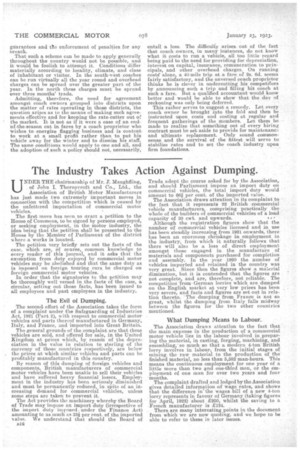The Industry Takes Action Against Dumping.
Page 2

If you've noticed an error in this article please click here to report it so we can fix it.
UNDER THE chairinanship of Mr. X. Maughfling, of John I. Thornycroft and Co., Ltd., the Association of British Motor Manufacturers has just made two extremely important moves in connection with the coinpetition which is caused by the unfettered importation of commercial motor vehicles.
The first move has Peen to aratt a petition to the House of Commons, to be signed by persons employed, or seeking employment, in the motoe industry, the idea being that the petition shall be presented to the House by the Member of Parliament of the district ;a here a works is located.
The petition very briefly sets out the facts of the case, which are, of course, common knowledge to every. reader of this journal, and it asks that the exemption from duty enjoyed by commercial motor vehicles may be abolished and that the same duty as is imposed on foreign touring cars be charged on foreign commercial motor vehicles. .
In order that the signatories to the petition may be thoroughly well versed in the facts of the case, a circular, setting out those facts, has been issued to all employees and past employees in the industry.
The Evil of Dumping.
The second, effort of the Association takes the form of a complaint under the Safeguarding of Industries Act, 1921 (Part 2), with respect to commercial motor vehicles and parts thereof manufactured in Germany, Italy, and France, and imported into Great Britain.
The general grounds of the complaint are that these vehicles are sold, and offered for sale, in the United Kingdom at prices which, by reasdn of the depreciation in the value in relation to sterling of the currency of those countries respectively, are below the prices at which similar vehicles and parts can be profitably manufactured in this country.
By reason of this dumping of foreign vehicles and components, British manufacturers of commercial motor vehicles have been unable to sell their vehicles and have suffered heavy financial losses. Employment in the industry has been seriously diminished and must be permanently reduced, in spite of an increasing demand for commercial vehicles, unless some steps are taken to prevent it.
The Act provides the machinery whereby the Board of Trade may impose an import duty (irrespective of the import duty imposed under the Finance Act) amounting to as much as 33* per cent. of the imported -table. We understand that should the Board of
.1316 Trade adopt the course asked for by the Association, and should Parliament impose an import duty on commercial vehicles, the total import duty would amount to 661 per cent. of the imported value. The Association draws attention in its complaint to the fact that it represents 22 British commercial vehicle manufacturer, comprising practically the whole of the builders of commercial vehicles of a load
capacity of 30 cwt. and upwards. ; P • Although the registration figures show that the number of commercial vehicles licensed and in use has been steadily increasing from 1921 onwards, there has been an enormous shrinkage in employment in the industry, from which it naturally follows thatthere will also be a loss of direct employment amongst those engaged in the manufacture of materials and components purchased for completion and assembly. In the year 1920 the nuniber of vehicles imported and retained in the country was very great. Since then the figures show a material diminution, but it is contended that the figures are not complete, and are, therefore, not reliable. . The competition 'from German lorries which are dumped on the English market at very low prices has been very severe, and facts and figures are set out in relation thereto. The dumping from France is not so great, whilst the dumping from Italy falls midway between the figures for the two other countries mentioned.
What Dumping Means to Labour.
The Association draws attention to the fact that the main expense in the production of a commercial motor vehicle lies in the labour involved in preparing the material, in casting, forging, machining, and assembling, so much so that a modern 4-ton British lorry involves in labour, from the initial stages of mining the raw material to the production of the finished material, no less than 6,582 man-hours. This means the continuous employment for one year of a little more than two and one-third men, or the employment of one man for over two years and four months.
The complaint drafted and lodged by the Association gives detailed information of wage rates, and shows that the difference in the wages bill of a new 4-ton lorry represents in favour of Germany (taking figures for April, 1922) about 2200, whilst the saving to a French manufacturer is 2124.
There are many interesting points in the document from which we are now quoting, and we hope to be able to refer to these in later issues.
































